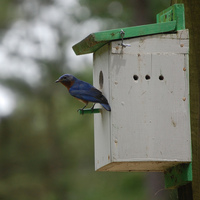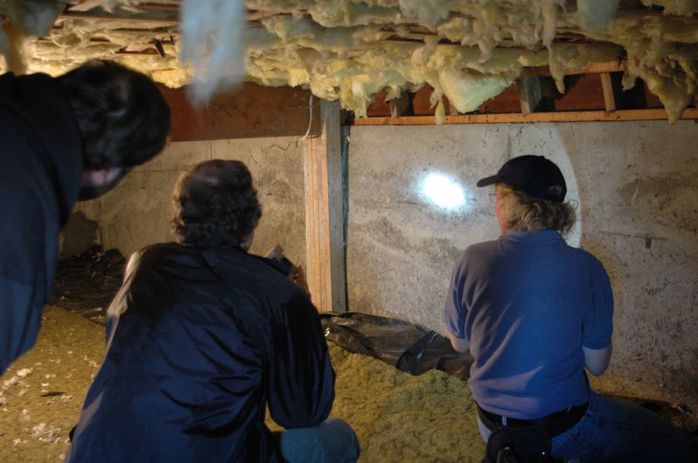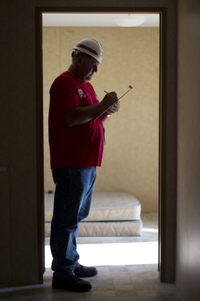 Vancouver House by Joe Mabel
Vancouver House by Joe Mabel
A new home isn’t just an investment. It’s the place where you and your family live and grow. The last thing any new homeowners want is for their home to turn out a burden in disguise. One of the best ways to avoid buying a lemon is to hire a professional home inspector. Most of us probably couldn’t tell if a house were in order just by looking at it, and there could be big problems we wouldn’t even notice before moving in.
Think of a home inspection like getting a check-up from your doctor. If nothing’s wrong, then you traded your time for the comfort of a clean bill of health. But if something is wrong, then you'll sure be glad you went out of your way. When you've found the house that just seems right, it's time to call in a home inspector. To get the most from your home inspection, there are some things every buyer should know.
What Inspectors Look For
 Home Inspection by D.L. Pardue
Home Inspection by D.L. Pardue
First, a home inspection isn’t going to cover every last thing about a home. An inspector will visually assess the house and report on structural problems and items that might soon need replacement. Inspectors report on structural elements such as framing, foundation, and roofs. They’re also supposed to examine the major systems in the house, including electrical, heating, air conditioning, and ventilation. Inspections are general and will leave out any hidden areas.
Consider how long you'd spend looking the house over yourself and how much you’d find out on your own. Likely not much, and that's where the value of an inspection comes in. However, to make the most of an inspection, it's important to know that inspectors won’t necessarily report on everything that might concern you. So it’s important to know exactly what an inspector will look for — but also what they won’t look for — before you hire one.
Home Inspection in BC
There are two formally recognized inspection associations in BC, and they both set out clear guidelines about what their inspectors must and must not report. These associations are the British Columbia Institute of Property Inspectors (BCIPI) and the Canadian Association of Home and Property Inspectors (CAHPI). Any independent inspector should also be able to outline her standards either through her website or by request.
Many buyers don’t understand that neither CAHPI nor BCIPI require their inspectors to report on environmental contaminants (such as asbestos or buried oil tanks). While the CAHPI standards don’t refer to mould or water damage, the BCIPI clearly states that inspectors don’t need to report "any evidence of water penetration, condensation, or mould." Both associations will inspect fireplaces, but neither will assess the interior of the chimney.
An Expert Inspector Shares his Advice
Bruce Hunter, an independent home inspector with 17 years of experience, notes that insurance policies and concerns about liability can pressure inspectors not to report on issues like mould — even though their client might assume they would. Hunter stresses that buyers "must know before the inspector starts his work what will not be commented on in the inspector's report."
 Home Inspection by Justin Baeder
Home Inspection by Justin Baeder
Not all inspectors will feel qualified to report on all issues, which is why it’s important to read their contracts. If you’re concerned about issues that are not explicitly stated in the contract, then Hunter advises, "Make it crystal clear to the inspector before the inspection that he wants these things checked. If the inspector says he will not offer this service, then the buyer can bring in an expert at the time of the inspection to check for mould et cetera." Compare the services offered by several inspectors before hiring one to make sure you’re getting the most of your home inspection.
Finding the Right Home Inspector
You should put as much care into choosing an inspector as you put into finding an honest, professional realtor. Most realtors will refer home inspectors to their clients, and you can gauge the quality of a realtor by the quality of the inspector he recommends. Don't fall for unprofessional real estate agents who recommend shoddy inspectors! Take the time to choose a qualified realtor you can trust. Make sure your inspector has a proven record of satisfied customers. Look for testimonials, or talk with any friends who've hired a home inspector recently. Check out the companies listed on the Better Business Bureau of BC’s website. You wouldn't simply choose any real estate agent, so don't choose the first or the cheapest inspector that comes along.Buying a home is one of the most important decisions you can make. You want as much information as possible about a place before you decide to move in, and a good home inspector will help you get it. To make the most of your home inspection, hire a reliable professional and establish in advance what will be examined and what will be left out. Take the time to find an inspector with proof of high customer satisfaction whom you can trust to tell you what you need to know about a house before you make it your home.



